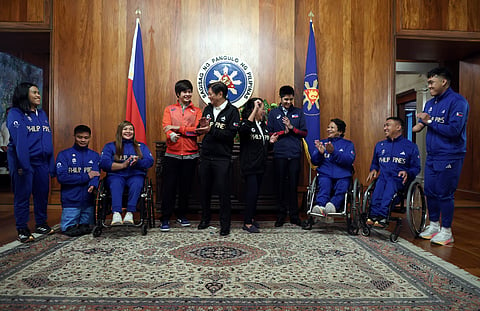
- NEWS
- the EDIT
- COMMENTARY
- BUSINESS
- LIFE
- SHOW
- ACTION
- GLOBAL GOALS
- SNAPS
- DYARYO TIRADA
- MORE

Once again, President Ferdinand “Bongbong” Marcos opened the doors of Malacanang for Filipino athletes to enter.
They may not be as popular as Carlos Yulo or Ernest John Obiena, but the Chief Executive still gave them a royal welcome fit for returning heroes.
Six brave Filipino athletes who saw action in the recent Paris Paralympics were honored by President Marcos and his family during a courtesy call at the Palace.
In a simple gathering, President Marcos expressed his gratitude to thrower Cendy Asusano, archer Agustina Bantiloc, taekwondo jin Allain Ganapin, wheelchair racer Jerrold Mangliwan and swimmers Angel Otom and Ernie Mangliwan for representing the country well in the world’s biggest sports conclave for differently abled athletes that was held from 28 August to 8 September.
President Marcos was accompanied by First Lady Liza Araneta Marcos, sons Simon and Vincent, who shared a light moment as they talked to the athletes before the ceremony.
Although they failed to secure a medal, the Filipino Paralympians were still given P1 million each as cash reward for their hard work and dedication in their pursuit for sports excellence.
“Together with First Lady Louise Araneta Marcos and the rest of the First Family, the President awards P1 million cash incentive and Presidential citation to each of the six Paralympians,” the Presidential Communications Office said after the ceremony witnessed by Executive Secretary Lucas Bersamin and Philippine Paralympic president Michael Barredo.
President Marcos’ gesture to the para athletes was no longer surprising as he is known to have a soft heart to those who are bravely competing for the pride and glory of the country.
He took a page from the playbook of his father, the late former President Ferdinand Marcos Sr., in running the country’s national sports agenda.
During the time of the former Chief Executive, the country enjoyed tremendous success in the international arena, giving birth to the legendary careers of some of the best and the brightest athletes in Philippine sports like Lydia de Vega-Mercado, Elma Muros, Isidro del Prado and Hector Begeo.
Headed by his cousin, Michael Keon, the Project: Gintong Alay Program that was instituted in 1979 was so successful that other countries were lining up to adopt it.
Indeed, the son acquired the expertise and savviness of his father when it comes to managing the sports program.
Since President Marcos was elected in 2022, the country had reaped honors in various international events ranging from the Southeast Asian Games to the Asian Games up to the Olympics.
In the SEA Games, the Filipinos managed to win 58 gold medals in Cambodia in 2023 – the most number of mints in any biennial meet held outside the country.
A few months later, the Filipinos brought honor in the Asian Games in Hangzhou, China when Gilas Pilipinas clinched the gold medal in the men’s basketball event for the first time in 61 years. The basketball gold may just be a solitary mint in the medal tally, but it’s still the most important honor for a country that treats basketball as its national pastime.
In the end, Filipino athletes took home four gold medals.
Then came the Paris Olympics last July.
President Marcos was very hands-on in boosting the morale of the Filipino athletes, who were shooting for glory in the aftermath of Hidilyn Diaz’s breakthrough win in the previous edition of the Summer Games in Tokyo three years ago.
In fact, before they left for their training camp in France in June, Marcos gathered the Filipino athletes to give them P500,000 each as pocket money that will motivate them to give their best in the biggest, most prestigious sports event in the world.
The plan worked as the athletes — led by gymnast Yulo, and boxers Nesthy Petecio and Aira Villegas — took home two gold and two bronze medals to cap off the country’s most successful participation in the Olympics ever.
The country erupted in celebration with Yulo being hailed not just as the best Filipino Olympian ever, but also as a national hero for winning multiple gold medals against the best athletes in the world.
President Marcos sure knows how to appreciate.
He immediately invited the athletes to Malacañang for a state dinner before rewarding them cash incentives that could change their lives forever.
Yulo, for one, went home with a total of P40 million after the Chief Executive decided to double the P10 million incentive for an Olympic gold medal. Other Olympians — despite not bringing home an Olympic medal — still walked away with P1-million cash reward.
“I apologize if it is just a small amount. I know that P1 million is small if you compare it to your sacrifice and the experiences you went through. But for now, this is what we’ll do,” Marcos said.
“If you can consider all of these athletes who have done so well and have made us so proud, there is no official technical support from the government. They did it on their own.”
“Of course, they get help. Sometimes, the government helps, but there is no formal structure to help our athletes and that is what we’re going to establish now.”
Marcos said the country’s success in the Olympics is just the start as he will work hard to boost the sports sector to discover and develop more athletes who would bring pride and glory to the country.
“I want to be part of the development of sports in the Philippines. We’ve already been left behind,” Marcos said.
“If you can consider all of these athletes who have done so well and have made us so proud, there’s no official, technical support from the government.”
True enough, President Marcos isn’t just a strong leader.
He is also an avid sports fan with a heart of gold.
